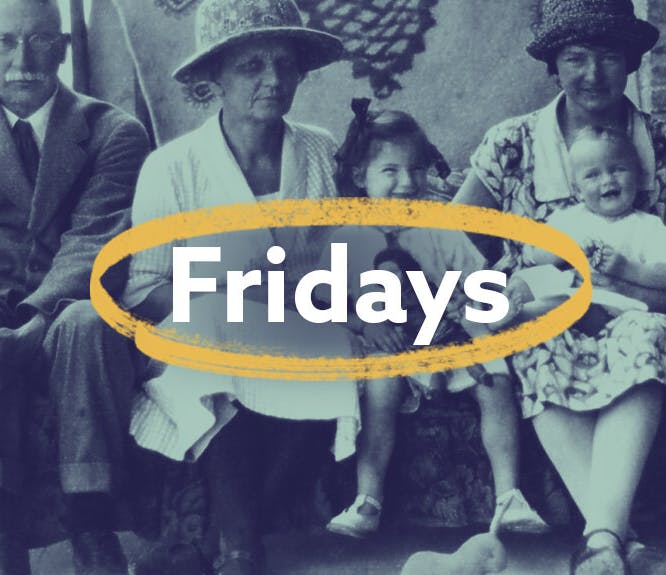Discover the forgotten stories of D-Day through the eyes of the soldiers who were there
7-8 minute read
By Niall Cullen | June 3, 2021
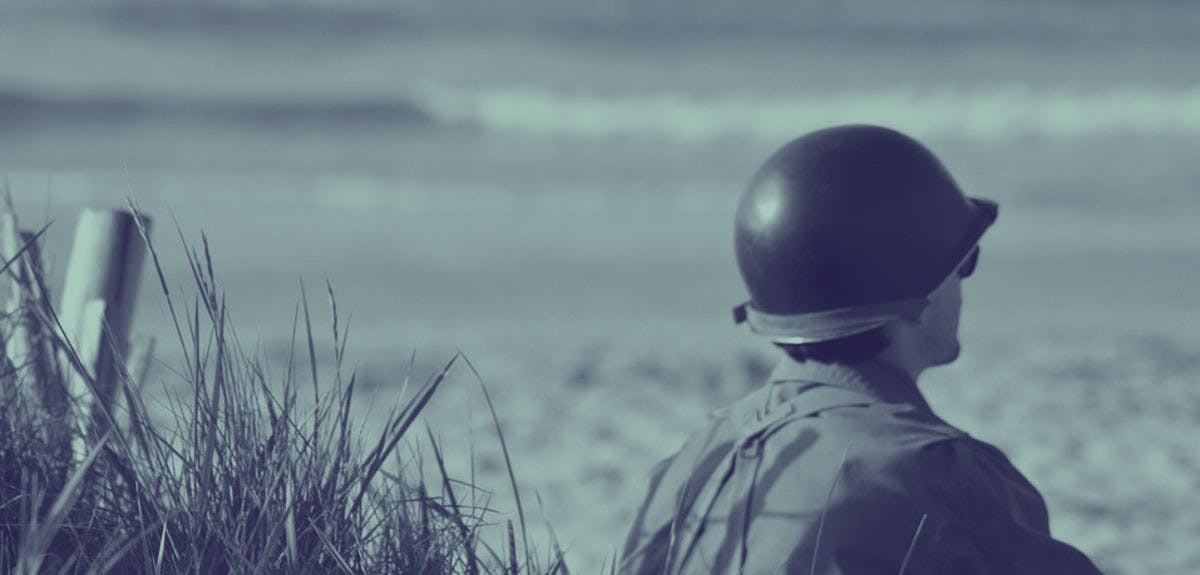
We've scrolled through our newspaper archives to discovering the forgotten stories of those who contributed to or were impacted by the largest military invasion in history.
D-Day was one of the most significant actions of the Second World War. An event that played a crucial role in the liberation of western Europe and the demise of Nazi Germany.
Codenamed, Operation Overlord, D-Day, was and still is the greatest military invasion mankind has ever seen. Over 150,000 troops from the United States, Great Britain, Canada, India and more took part, launching from the UK, landing via airdrops or on the beaches of Normandy to gain a foothold in France to push the Germans back and liberate Europe from Nazi rule.
The events have been told countless times through popular culture, perhaps most notably through the films, The Longest Day and Saving Private Ryan as well as the series, Band of Brothers. But how did this crucial day unfold for those at the heart of it?
With the help of Findmypast’s newspaper and photo collection, we’ve been able to discover D-Day's forgotten stories. By collating accounts of those who were on the ground taking part in the invasion, we are able to tell the stories of D-Day through the lens of the heroes responsible for its success.
D-Day diaries
Mr Hill was a private in the R.A.M.C. The diary of his D-Day experience, originally published in Leicester Chronicle in 1946 gives us an insight into the build up and start of the operation.
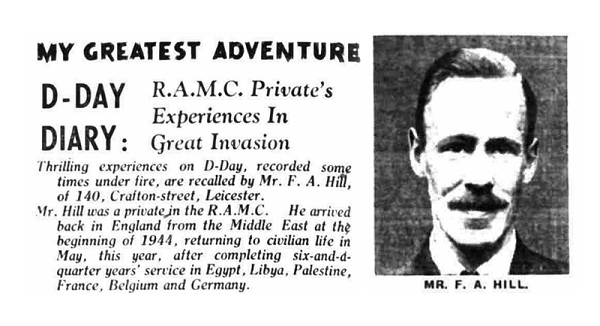
Leicester Chronicle, 26 October 1946. Read the full article.
The compelling memoir reads:
"At midnight 'General Quarters' was sounded. This was the first air-raid alarm for us during the intensive operations which were to follow. There was a great amount of flak from the ships which were crowded together. Several bombs dropped between us and the next ship. One of my mates was injured by flying shrapnel. On the morning of June 6th 'General Quarters' sounded again. During the night we rescued three men from the water after their small boat had overturned. An English L.S.T. fouled our stern anchor.
The sea was moderately rough. A dead American paratrooper was picked up by us and in his pocket was a poem about liberty, the last lines being 'For I have died to-day.’ Another air-raid alarm sounded as we went in-shore. There were several submerged tanks, wagons and cranes strewn around in the water. As the battle progressed, we prepared to receive casualties aboard. They started to arrive before we were quite ready. I counted 79 casualties at the start.”
Another eyewitness account talks about the ferocity from the heat of the battle.
"“I don't think we've ever had a shoot like it.”"
26-year-old Sergeant Robert Sturrock, of 5 Bellie S Brae, Kirriemuir, former gamekeeper, told me, says the correspondent.
"My mortars were able to fire more than a thousand rounds. We were putting in another bomb as soon as the first had left the barrel. In three hours and with our four mortars, we fired nearly 2000 rounds. By the time we finished, Lieutenant Ian Foggie, of 47 Magdalen Yard Road, Dundee, our officer, was deaf as a post... It was a nightmare scene. But the lads were on top form, and never stopped firing except when ammunition ran out.”
That interview was originally published on 6 July 1944 in Kirriemuir Free Press and Angus Advertiser, which had its last issue in 1960.
Day 1: D-Day in Normandy
Below is an extract from a lengthy diary of the fighting in Normandy on D-Day, sent home by former Hull Daily Mail photographer, John Robson, now serving with an infantry unit.
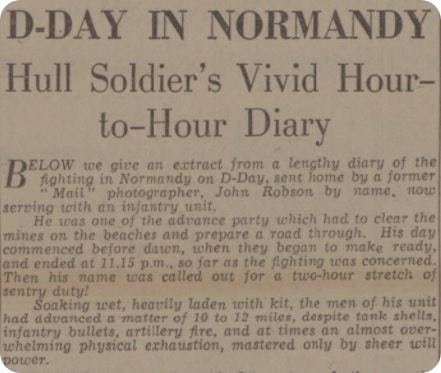
Hull Daily Mail, 7 August 1944. Read the full article.
Robson was part of one of the advance parties which had to clear the mines on the beaches and prepare a road through. His day commenced before dawn and ended shortly before midnight. His account recalls:
“We are all very quiet as the craft begins to ground. The bows are beginning to lower now. I prepare to jump into the sea. Not yet! The craft did a little waver, noses nearer and further up the beach— grounds again, and then stops. I jump as a third man into four feet of sea, swirling with the current. I can see figures laying prone to the earth firing at us through the smoke of a burning tank, which is a salvation for something which had gone adrift with the smokescreen on our sector of the beach. The R.E. lad on my left side gives a grunt, goes down, floundering in the sea, swirling around in the current to be drowned most likely. My fingers just slide over his clothes as I make a grab at him. I was helpless to do anything much for him, burdened as I was with all the kit. I couldn't even fire my rifle for protection.”
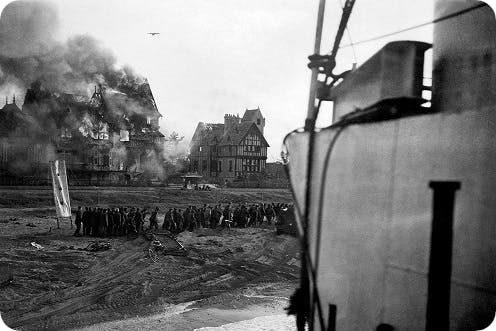
Civilian houses being destroyed as British troops are under fire on Juno beach shortly after the D-Day landings. View-in-full in the Findmypast Photo Collection.
“As we near the edge of the water we spread out. Other craft have grounded further along the beach. We are now abreast of them. They are disembarking with all types of material about their person, just as helpless as myself to shoot back the beach defenders. Some of the boys go down at the water's edge for a breather, but they come under direct machine-gun fire which criss-crosses the whole beach. Thank Heaven! I do the right thing in mustering every inch of energy and setting off to run up the beach as fast as my heavy feet will plough across the sodden sand. How its resistance torments me. I see a sand mound slightly ahead just as I'm about all in. I make a super effort and leap clumsily behind it.”
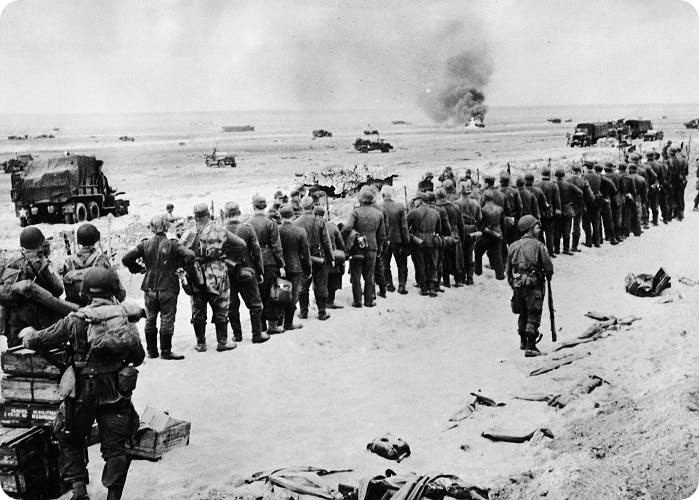
A long line of German prisoners files down to a prisoner of war camp on a beach in Normandy. View-in-full in the Findmypast Photo Collection.
“I turn towards the sea, witness the rest of the company coming up the beach, striding over, and even taking over from the victims of the enemy's fire. Soon the whole of the company is on the beach —at least those who make it, and thanks to the extensive amount of briefing before we left, everyone slips into their position quickly, to await the O.C. of the company, in order to take the lead before plunging inland to meet any resistance, leaving the beach defences to the naval and aerial bombardment. I take this opportunity to make last minute adjustments to gear and tin hat, which fell over my eyes during dash up the beach.”
“Now the beaches are strewn with casualties, especially on our left. The firing has become denser still. An 88 mm artillery gun opens up Flail Tanks (used for gaping minefields) as they thunder up the beach. First shot misses its target, hits the beach 20 yards from the company, diminishing the company's personnel still more. The second shot didn't miss its target. I know I swore aloud for them to get us off the beach, which is now becoming an inferno. I've got the scares a bit bad now. Never in the whole African and Sicilian skirmishes have I been so scared as I am now."
“Almost synchronised with my appeal, the O.C. of the company ordered “Fix bayonets!” jumped up and plunged up the rest of the beach on to the minefield. We follow trailing the white guide tape for the rest of the company to follow. How surprising under the turmoil of it all. As I couldn't find time to be terrified now. My terror for mines has forsaken me. I charge on over the mines, full of confidence in making the other side without mishap. How I'm staring at that far fence now. I've started to come out of the minefield. To have won some world championship in sport couldn't have given me more satisfaction as I step out of the minefield."
“Now the company passes in single file out of the mines. There are gaps in it. I fear the worst for some as I have heard detonated mines explode. As the last of the company comes through, so we are to return over the mines to make an official vehicle gap. But new orders have it that we push on with the company until the objective is taken.”
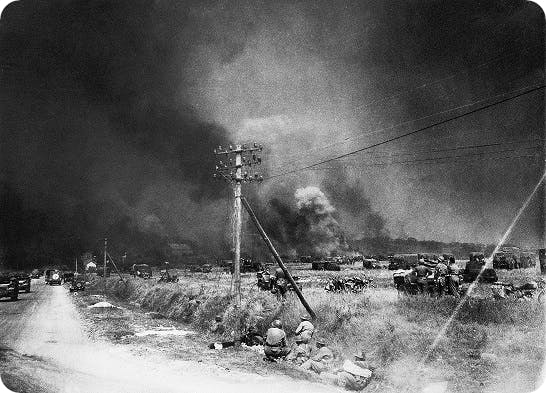
Allied soldiers take cover during the bombing of German positions. View-in-full in the Findmypast Photo Collection.
In another extract from Private Hill's diary mentioned above, he recounts his return to Britain following the invasion.
“On 7 June we worked all day dealing with these wounded personnel and had two hours sleep. I remember vividly an A.A. shell that exploded on our deck. On the following day we pulled out on the morning tide with a convoy and during the night had a running fight with E boats."
"Passing through the Straits of Dover we docked at Tilbury on the morning of 9 June and casualties were taken off. That night with my two pals Hank and Franco, we had a pub crawl. On the night of June 10 stood off Southend pier with a convoy, and the following day a smoke screen was laid between us and France as we fouled our stern anchor and went back to the Continent. We ran over a submerged tank which caused us to lose considerable quantities of oil and fuel, and damaged our screw.”
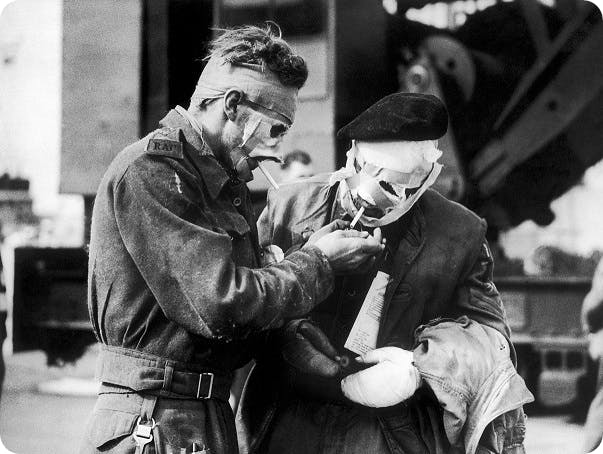
"On 14 June, 189 patients came aboard. We pulled out on an evening convoy bound for England. There were various air-raid alarms and I remember spending two hours giving nothing but hypodermic injections, anti-tetanus, anti-gas gangrene, penicillin, and morphia."
"Early on 15 June, all guns were going at once. We were attacked by torpedo bombers. It was an infernal racket. Three R.A.M.C. men were killed and one injured. But we got through and we arrived at Portsmouth opposite the famous 'Victory’.”
More D-Day stories
Alongside these rich D-Day diaries, we've compiled more memories from the Findmypast Community and our newspaper archives.
In good company
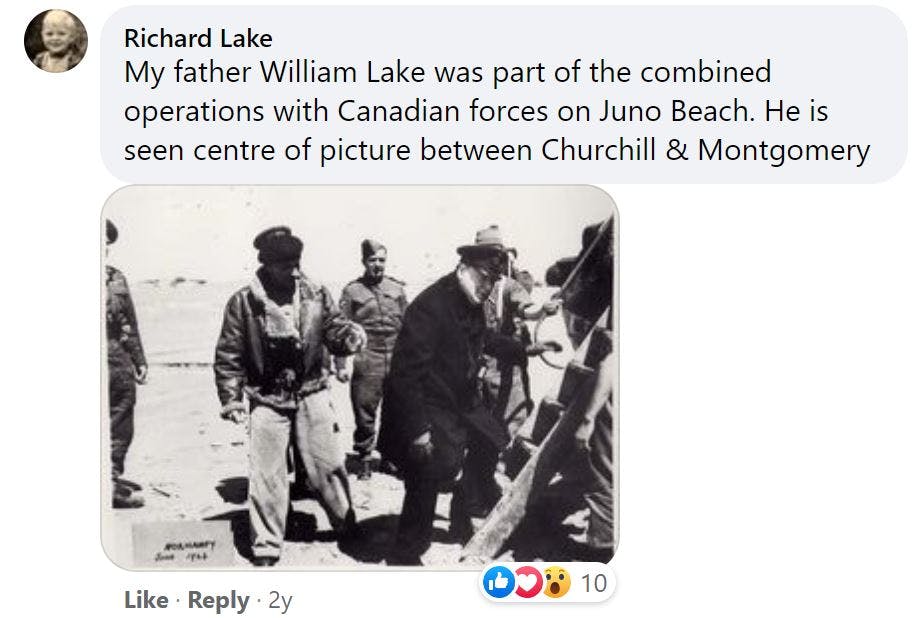
Summing up the hun
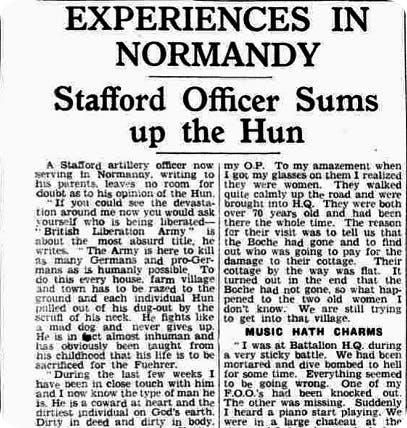
Staffordshire Advertiser, 5 August 1944. Read the full article
"The water was red with blood"
Findmypast's Alex Cox's grandfather was there on D-Day. Watch the video below as he recounts the terrifying experience.
Today, Alex proudly remembers joining his grandfather on his emotional return to the Normandy beaches.
Rescue below deck
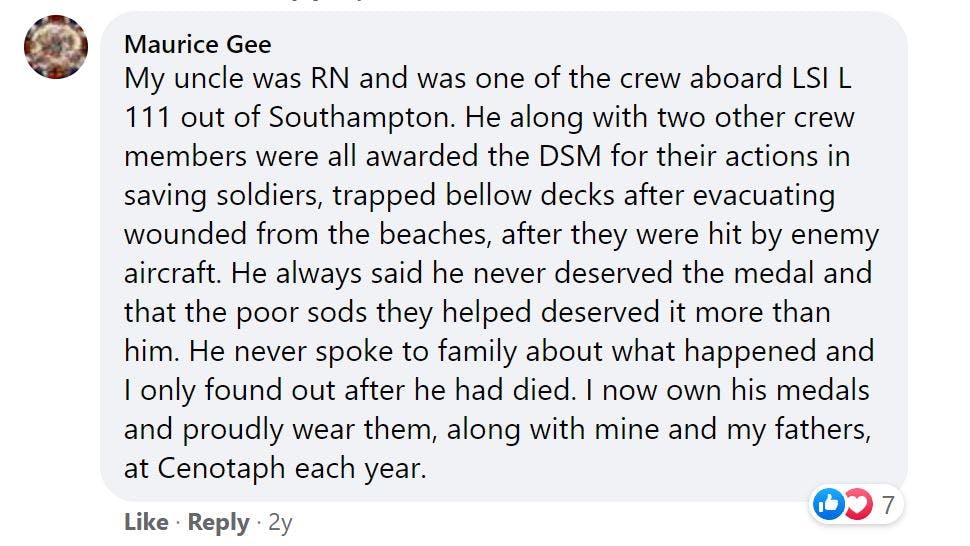
No casualties...yet

Manchester Evening News, 21 June 1944. Read the full article
Parachutes and preparations
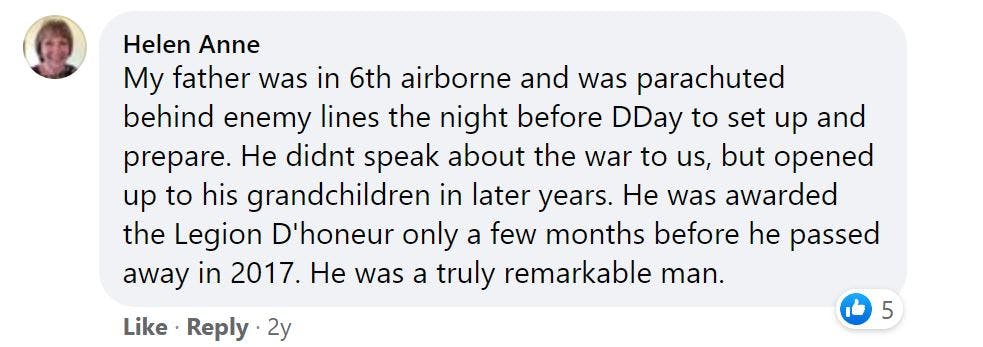
The scene from the ships
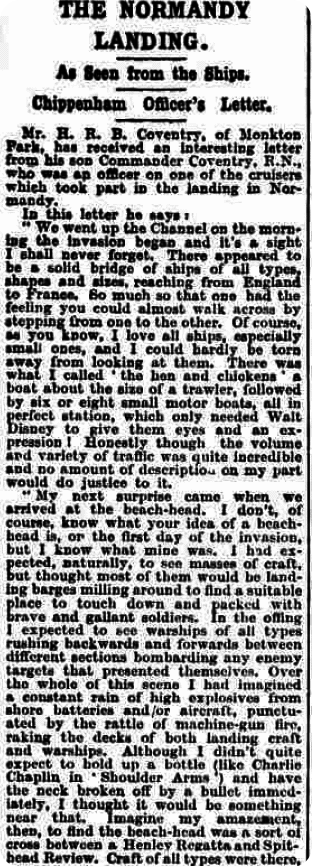
Wiltshire Times and Trowbridge Advertiser, 1 July 1944. Read the full article.
Fire beyond the beach
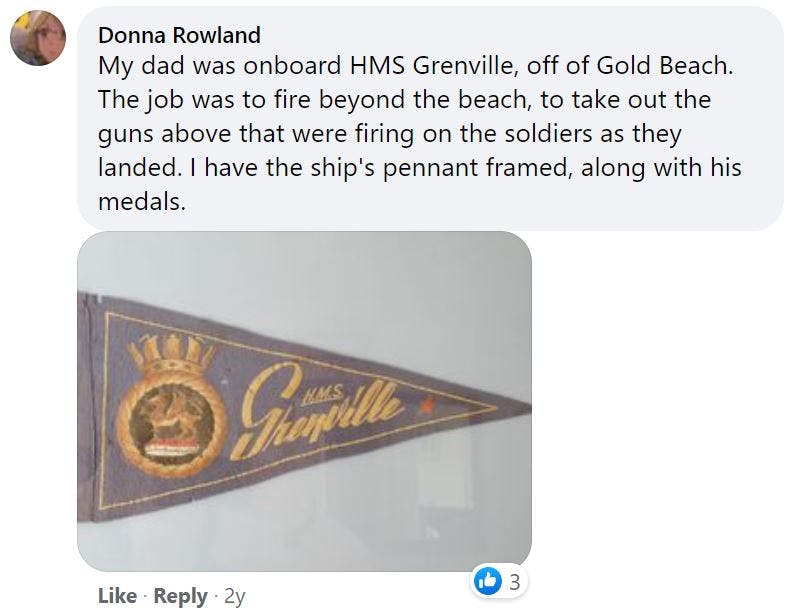
"The most frightening experience of my life"
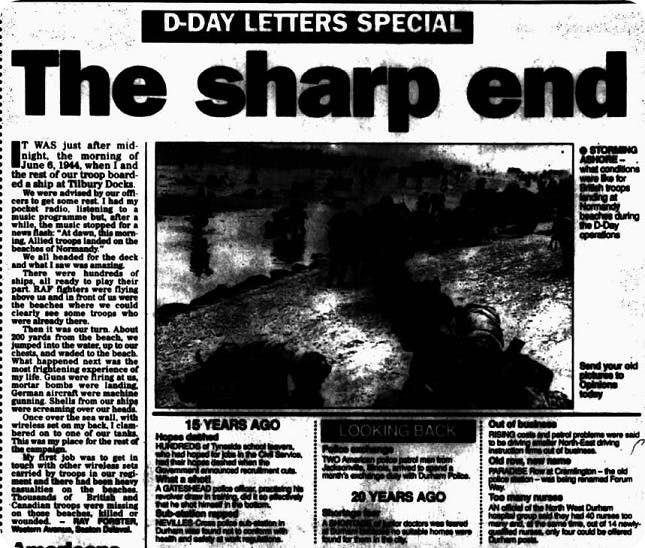
Newcastle Evening Chronicle, 23 May 1994. Read the full article.
Discover heroic family stories
These insights from those at the heart of the operation merely scratch the surface of what happened on D-Day. You can learn more and uncover your own family heroes with the help of Findmypast, preserving their stories for future generations. Do you have a story to share about a relative who lived or died during World War 2? Let us know by emailing discoveries@findmypast.com.
Related articles recommended for you
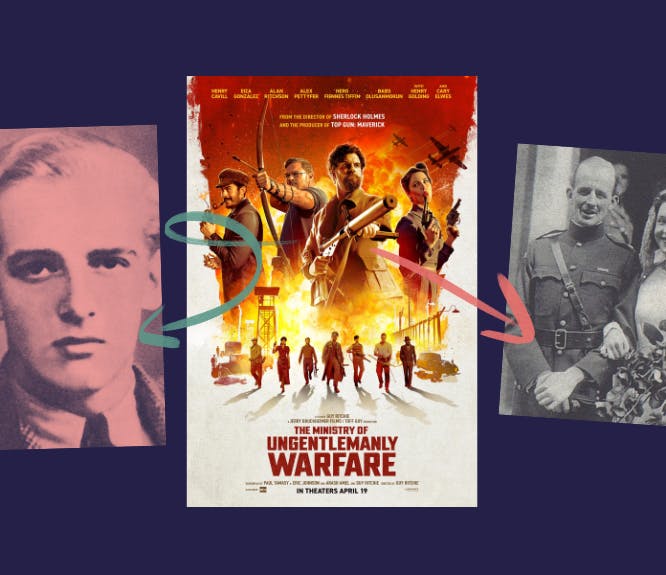
The incredible true story behind The Ministry of Ungentlemanly Warfare
History Hub
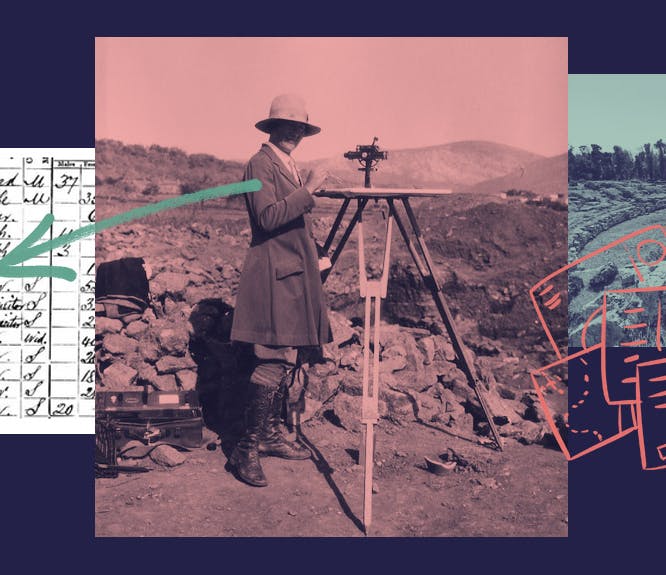
Inspirational women from history: the story of archaeologist-turned-spy Winifred Lamb
History Hub
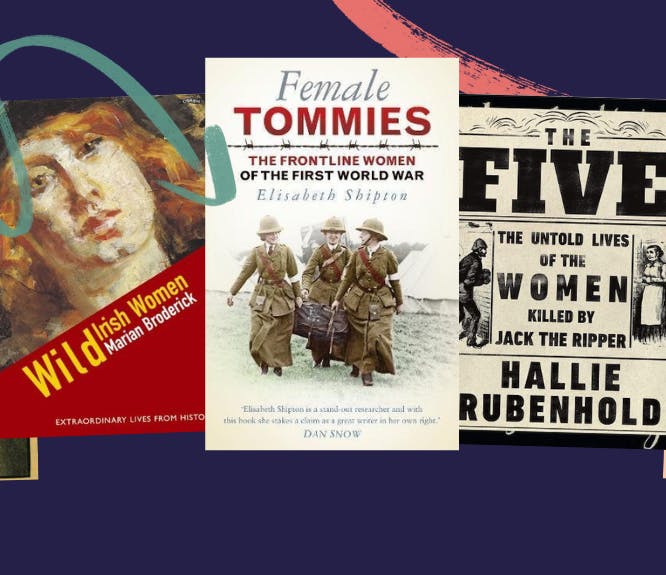
6 must-read books for Women's History Month (and beyond)
History Hub
